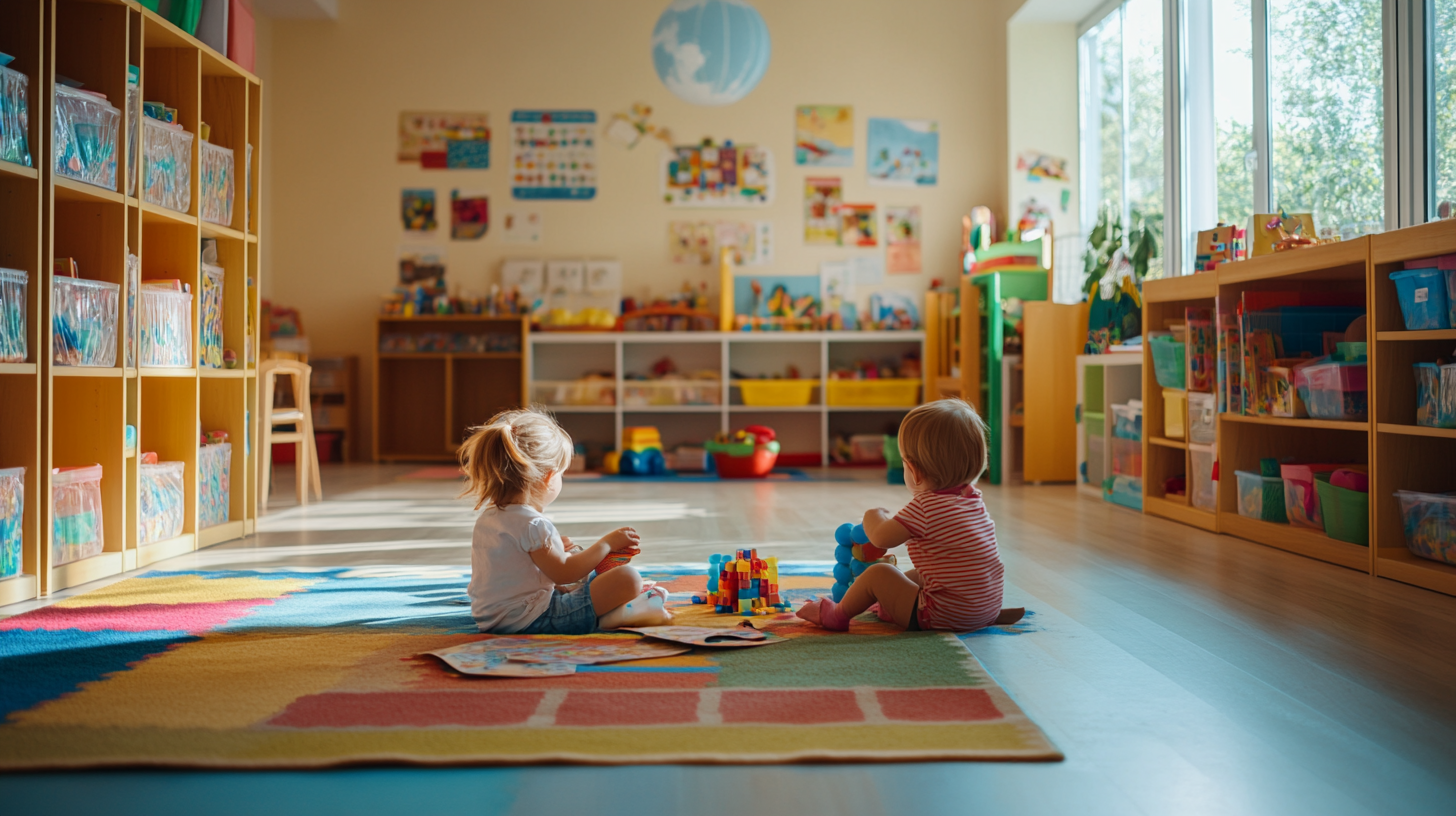In today’s fast-paced world, developing problem-solving skills from a young age is crucial for children. These skills not only aid in academic success but also in everyday life challenges. One often overlooked yet powerful environment for nurturing these abilities is the daycare center. Daycare centers provide a structured yet flexible environment where children can explore, experiment, and learn through play and interaction.
The Importance of Problem-Solving Skills in Children
Problem-solving skills are essential as they help children navigate both simple and complex challenges. Whether it’s resolving a conflict with a friend or figuring out how to build a block tower without it toppling over, these skills are fundamental. In daycare centers, children are encouraged to think critically and creatively, fostering a sense of independence and confidence.
Building a Foundation for Future Success
Problem-solving is more than just finding answers; it’s about understanding processes and developing strategies. Children who develop strong problem-solving skills at an early age tend to perform better academically and socially. They learn to approach challenges with a positive mindset and are better equipped to handle setbacks.
These skills also translate into improved emotional intelligence, as children learn to manage their emotions and reactions when faced with difficulties. Understanding the value of perseverance and patience becomes a core part of their character, which is invaluable in various life situations.
Moreover, children with strong problem-solving skills are often more curious and willing to explore new concepts. This curiosity drives them to seek knowledge and understanding, laying a solid foundation for lifelong learning and innovation.
Encouraging Critical Thinking
Daycare centers offer numerous opportunities for children to engage in critical thinking. Activities are designed to challenge their thought processes, requiring them to ask questions, make predictions, and draw conclusions. This active engagement helps children understand cause-and-effect relationships and improves their decision-making abilities.
Through critical thinking exercises, children become adept at analyzing situations and considering multiple perspectives. This skill is crucial, as it allows them to make informed choices rather than impulsive decisions.
Additionally, critical thinking nurtures a child’s ability to evaluate evidence and reason logically. These competencies are vital not just in academic settings but also in everyday interactions, where sound judgment is often required.
Promoting Emotional Intelligence
Problem-solving skills are deeply intertwined with emotional intelligence. As children learn to solve problems, they also learn to manage their emotions, such as frustration or disappointment. Daycare centers teach children to express their feelings and understand others’ emotions, enhancing their empathy and social skills.
Developing emotional intelligence helps children navigate social interactions more effectively, building stronger relationships with peers and adults. This skill is crucial in fostering a sense of community and belonging within the daycare environment and beyond.
Furthermore, emotional intelligence aids in conflict resolution, as children learn to approach disagreements with understanding and patience. This ability to empathize and communicate effectively is a cornerstone of successful interpersonal relationships throughout life.

How Daycare Centers Foster Problem-Solving Skills
Daycare centers utilize a variety of methods to enhance children’s problem-solving abilities. Through structured activities and free play, children learn to work through obstacles and develop resilience.
Interactive Play and Learning
Play is a natural way for children to explore and learn. In daycare centers, interactive play is a cornerstone of the curriculum. Whether it’s building with blocks, engaging in pretend play, or solving puzzles, children are constantly faced with opportunities to think critically and solve problems. These activities promote cognitive development and encourage children to experiment with different solutions.
Interactive play also enhances children’s creativity, as they learn to imagine and create new scenarios. This creative process is integral to developing innovative problem-solving skills, as children learn to think outside the box and approach challenges from unique angles.
Moreover, through play, children develop fine and gross motor skills, which are important for executing physical tasks and understanding spatial relationships. These skills contribute to their overall problem-solving capabilities, allowing them to navigate physical challenges effectively.
Group Activities and Collaboration
Collaboration is key in problem-solving. Daycare centers often incorporate group activities that require children to work together to achieve a common goal. These activities teach children the value of teamwork and communication. By working with peers, they learn to listen to different perspectives and negotiate solutions, which are essential skills in problem-solving.
Group activities also foster a sense of community and belonging, as children learn to support and rely on one another. This social aspect is crucial, as it helps children develop a sense of empathy and understanding for others’ needs and viewpoints.
Furthermore, collaboration encourages children to take on leadership roles and learn the importance of compromise. These experiences are vital in shaping their ability to lead and cooperate in various settings throughout their lives.
Role of Educators
Educators in daycare centers play a significant role in developing children’s problem-solving skills. They guide children through challenges, providing support and encouragement while allowing them the freedom to explore solutions. Educators also model problem-solving behaviors, demonstrating how to approach and resolve conflicts effectively.
By creating a nurturing and supportive environment, educators empower children to take risks and learn from their mistakes. This approach is essential in building resilience and confidence in their problem-solving abilities.
Additionally, educators tailor activities to meet the individual needs and interests of each child, ensuring that every child is engaged and motivated to learn. This personalized approach enhances children’s ability to apply problem-solving skills to real-world situations.
Real-Life Applications of Problem-Solving Skills
The problem-solving skills developed in daycare centers extend beyond the classroom. Children apply these skills in real-life situations, enhancing their ability to tackle everyday challenges.
Conflict Resolution
Conflict is a natural part of life, and learning to resolve it is a critical skill. In daycare centers, children are taught to articulate their feelings and listen to others, which helps them resolve disagreements amicably. This practice not only improves their social interactions but also prepares them for future interpersonal relationships.
By learning to address conflicts calmly and respectfully, children develop a sense of fairness and justice. This understanding is crucial in fostering harmonious relationships throughout their lives.
Moreover, conflict resolution skills enable children to handle difficult situations with maturity and poise, reducing anxiety and stress in challenging circumstances. This emotional resilience is an invaluable asset in both personal and professional settings.
Adaptability and Resilience
Life is unpredictable, and the ability to adapt is essential. Daycare centers teach children to be flexible thinkers, allowing them to adjust to new situations and overcome obstacles. This adaptability fosters resilience, helping children bounce back from setbacks and continue pursuing their goals.
Adaptability also encourages a growth mindset, where children view challenges as opportunities for learning and development. This perspective is crucial in promoting lifelong learning and personal growth.
Furthermore, resilience helps children manage stress and maintain emotional balance in the face of adversity. This ability to stay grounded and focused is essential for achieving long-term success and well-being.
Enhancing Creativity
Problem-solving often requires creative thinking. Daycare centers encourage children to think outside the box, explore new ideas, and experiment with different approaches. This creative mindset is invaluable, as it enables children to innovate and find unique solutions to problems.
Creativity also enhances children’s ability to express themselves and communicate effectively. This skill is vital in building strong connections with others and conveying ideas clearly and persuasively.
Moreover, fostering creativity helps children develop a sense of identity and self-confidence, as they learn to value their unique perspectives and contributions. This self-assurance is crucial in navigating the complexities of the modern world.

The Role of Parents in Supporting Problem-Solving Skills
While daycare centers provide a strong foundation for problem-solving, parents play a crucial role in reinforcing these skills at home.
Encouraging Exploration
Parents can support their children’s development by encouraging exploration and curiosity. Allowing children to try new activities and face challenges helps them build confidence in their problem-solving abilities.
By providing a safe and supportive environment, parents empower children to take risks and learn from their mistakes. This freedom to explore fosters a sense of autonomy and independence, which is essential for developing problem-solving skills.
Additionally, parents can model curiosity and enthusiasm for learning, inspiring children to approach challenges with a positive and inquisitive mindset. This attitude is crucial in promoting lifelong learning and personal growth.
Providing Opportunities for Decision-Making
Involving children in decision-making processes, whether it’s choosing what to wear or planning a family activity, empowers them to think critically and make informed choices. This practice enhances their decision-making skills and boosts their confidence.
By giving children the opportunity to make choices, parents help them develop a sense of responsibility and accountability. This understanding is vital in fostering independence and self-reliance.
Moreover, decision-making experiences teach children the value of considering consequences and evaluating options, which are essential skills in effective problem-solving. This ability to make thoughtful and deliberate choices is crucial in various aspects of life.
Creating a Supportive Environment
A supportive home environment is essential for fostering problem-solving skills. Parents should offer guidance and encouragement, allowing children to explore solutions independently while being available for assistance when needed.
By creating a nurturing and positive atmosphere, parents help children build resilience and confidence in their problem-solving abilities. This support is crucial in helping children overcome challenges and achieve their goals.
Furthermore, a supportive environment encourages open communication and collaboration, allowing children to express their thoughts and ideas freely. This openness fosters a sense of trust and mutual respect, which is vital for building strong relationships and effective problem-solving.
Conclusion
Daycare centers play a vital role in developing children’s problem-solving skills. Through interactive play, collaborative activities, and the guidance of educators, children learn to think critically, adapt to new situations, and resolve conflicts. These skills are essential for future academic and personal success. By fostering problem-solving abilities at a young age, daycare centers help lay the foundation for a lifetime of effective decision-making and creative thinking. As parents and educators, it is our responsibility to support and nurture these skills, ensuring that children are well-equipped to navigate the challenges of the world.
By recognizing the importance of problem-solving skills and actively promoting their development, we can help children become confident, capable, and resilient individuals. This proactive approach is crucial in preparing the next generation to thrive in an ever-changing and complex world. Let us commit to fostering these essential skills, ensuring that every child has the opportunity to reach their full potential and contribute meaningfully to society.
Contact Discovery Time Learning Center
Are you ready to support your child’s development in problem-solving and creativity? At Discovery Time Learning Center, we provide a nurturing environment that fosters exploration, decision-making, and resilience.
Contact us today to learn more about our programs and how we can help your child thrive! Together, we can empower the next generation to navigate challenges with confidence and creativity.



